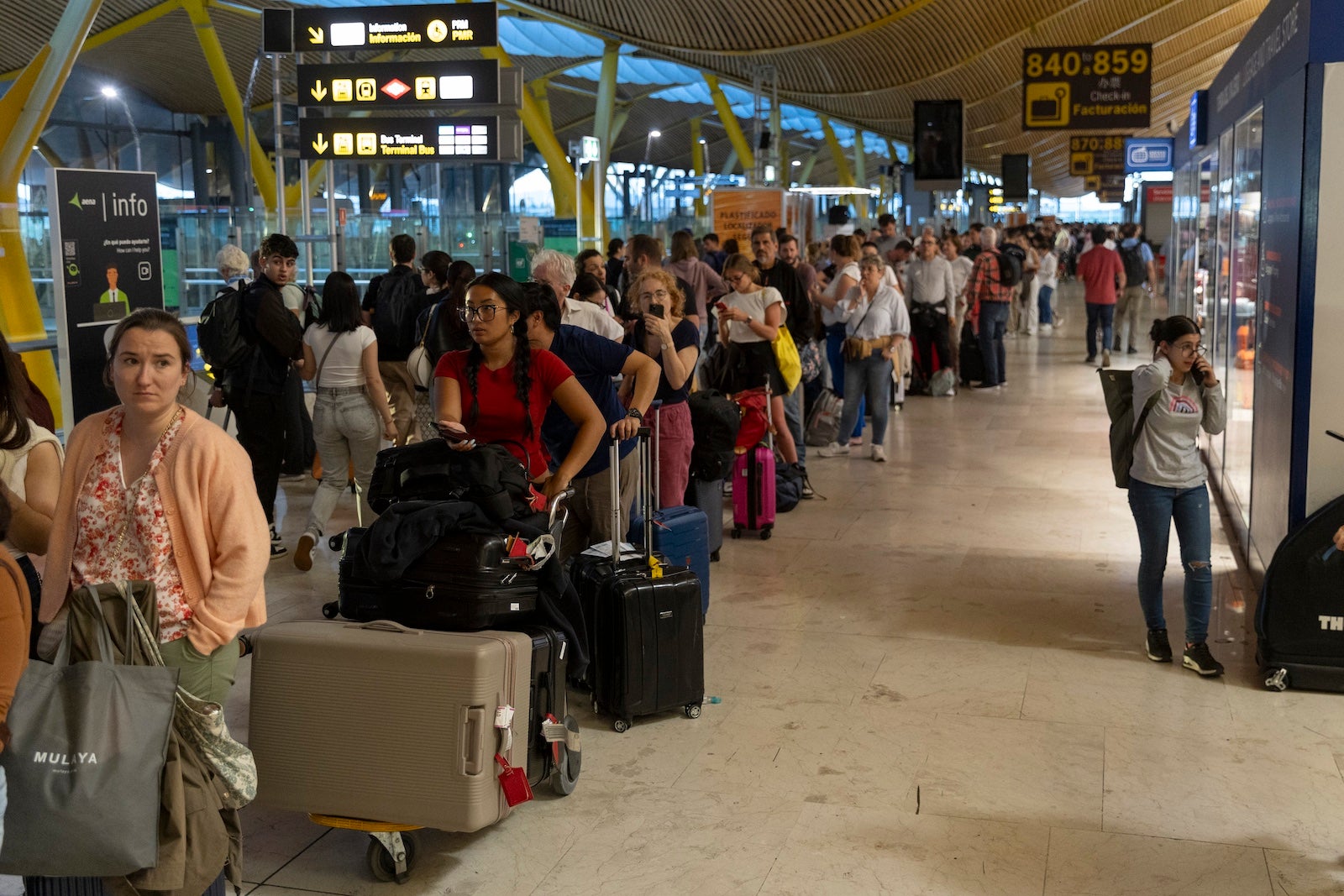Blackouts, Strikes And Ground Stops: What To Do If You’re Traveling This Week And How To Be Prepared On Your Next Trip

This week has provided plenty of reminders about what can go wrong when it comes to travel.
In Spain and Portugal, airlines, airports, rail lines and just about every facet of the economy are only beginning to get back on track after widespread blackouts Monday snarled travel and upended routines.
Investigators are still searching for the cause of the outages, NBC News reported. The blackouts swept across a large swath of both countries and parts of France on Monday, leading to airport shutdowns, halted trains and overall mass confusion (not to mention darkness) on the ground.
Other regions have had to contend with travel woes, too.
Labor strikes in Belgium led to flight disruptions piling up Tuesday. And, stateside, a Federal Aviation Administration outage Monday threw a wrench in flight schedules at one of the nation’s busiest airports.
Suffice it to say, the week has gotten off to a rocky start when it comes to travel — with less than a month, now, until the peak summer travel season ramps up.
Passengers faced long lines Monday at Adolfo Suárez Madrid-Barajas Airport (MAD). PABLO DOMINGUEZ/GETTY IMAGESHere’s what we know about the disruptions and what you can do to prepare — whether you’re in the thick of travel woes, preparing to travel in the next few days, or hoping to be ready for your next trip.
Blackouts in Europe
Monday’s blackouts left people in the dark throughout much of Spain and Portugal, and key infrastructure was still coming back online a day later.
Spain’s government was set for an emergency meeting Tuesday, as airports and airlines began to get operations back on track.
But there was plenty to untangle: More than 40% of departures Monday were delayed in Madrid and Barcelona, according to FlightAware, and 27% of departures from Lisbon were delayed.
Travel disruptions amid the blackout at Lisbon Airport (LIS). ADRI SALIDO/GETTY IMAGESAirlines and rail operators issued travel waivers that allowed passengers to change their itineraries at no added cost. That included Spanish flag carrier Iberia, which allowed passengers to rebook on any flights on the same route or up to 300 kilometers (about 186 miles) away at no added cost through May 11.
Brussels labor strike
It wasn’t just the Iberian Peninsula affected by travel disruptions this week.
In Belgium, Brussels Airport (BRU) urged passengers not to come to the airport amid a labor strike by ground crew members, which fueled mass flight cancellations.
Update 4 #unionaction April 29 ⚠️ Departing flights will unfortunately be cancelled due to participation from security & handling staff to the action. We ask passengers not to come to the airport today. We apologise for the inconvenience. ➡️ More info: https://t.co/0FcxF5KJVA pic.twitter.com/TaUm7uB6ED
— Brussels Airport (@BrusselsAirport) April 29, 2025
By early afternoon Eastern time, nearly 30% of departures from BRU had been canceled, per FlightAware.
US travel woes
Meanwhile, flyers in parts of the U.S. dealt with a myriad of disruptions early in the week.
On Monday, Newark Liberty International Airport (EWR) reported an FAA equipment outage that at one point led the agency to halt all takeoffs and landings, and fueled hundreds of flight delays and cancellations.
Due to FAA equipment outage, arrivals and departures are currently delayed at EWR. Please contact your airline for flight status.
— Newark Liberty International Airport (@EWRairport) April 28, 2025
Other carriers warned of potential disruptions from thunderstorms in parts of the Deep South, including American’s megahub at Dallas Fort Worth International Airport (DFW).
Watch for airline alerts and waivers
Whether you’re actively battling travel disruptions or planning to fly in the coming days, keep an eye out for alerts from your airline, via email or your carrier’s mobile app.
Particularly when it comes to international travel from the U.S., your carrier may issue bulletins to keep you up to date on problems at your destination.
The three U.S. carriers that currently fly to Spain and Portugal issued advisories that allowed passengers bound for destinations like Lisbon, Porto, Madrid and Barcelona to make free itinerary changes — even when flying on ordinarily restrictive basic economy fares:
Closer to home, United did the same amid FAA outages at its Newark hub.
Stay glued to the airline’s app
Keep in mind, in many cases, when your flight is delayed or canceled — whether it’s due to weather, maintenance or some other unforeseen issue — you may be able to avoid waiting on hold with the airline (or standing in a long line at the airport) by making flight changes with a few taps right in your airline’s app.
Flight canceled or delayed? Here’s what to do next
Problem with your long-haul flight? Just get to Europe
If you’re headed to Europe and there’s a major disruption in your destination city, you might ask if the airline can route you to a different European city and, through one of its partners, book you on a separate short-haul flight to your final destination.
About 10 years ago, I was headed to Paris, but my flight got canceled due to a labor strike affecting Paris-Charles de Gaulle Airport (CDG).
My airline ended up sending me to London’s Heathrow Airport (LHR) that same night instead, and then I flew to Paris the next day.
In the case of the recent blackouts in Spain or Portugal, if I’d had a flight on Monday, I probably would have asked my airline to route me to its biggest alliance hub in Europe, where there would likely be ample connection opportunities on one of its partner airlines.
These types of changes can sometimes keep you from having to wait 24 hours (or more) to get your trip back on track.
Watch for alerts on official social media channels
Even when you’re traveling abroad, watch for important alerts on your airline’s or rail line’s website or official social media channels, just like you would when traveling domestically.
A Renfe train at Madrid’s Atocha railway station. SEAN CUDAHY/THE POINTS GUYFor instance, Spanish high-speed rail line Renfe used X to alert passengers affected by this week’s outages that they’d be entitled to refunds or rebooking.
Actualización de los servicios de Renfe:https://t.co/P8sDw2uAWx
Los viajeros afectados por la falta de suministro eléctrico podrán solicitar la devolución y cambio sin coste en los canales de venta de Renfe.
Renfe actualizará la información en sus redes sociales y canales…— Renfe (@Renfe) April 29, 2025
Keep in mind, major social media platforms offer translations of posts, offering a way to get the key information.
Madrid’s Atocha rail station during Monday’s blackout. THOMAS COEX/AFP/GETTY IMAGESKnow your air travel rights
As always, it’s important to know your rights as a passenger when flying.
US refund rules
Stateside, U.S. Department of Transportation rules require airlines to issue passengers prompt refunds when their flight is canceled or significantly delayed — if they choose not to travel, and don’t accept rebooking.
On the other hand, if an airline offers a passenger a later flight and the passenger accepts, they would not be eligible for a refund.
Read more: You are entitled to a refund for your canceled flight
Meals, hotels and vouchers
In some cases, an airline may cover meal, hotel and ground transportation expenses for passengers facing flight cancellations or long delays. Those promises are spelled out on the DOT’s Airline Customer Service Dashboard.
Keep in mind, though, these guarantees generally only apply during “controllable” disruptions deemed the airline’s fault. In most cases, bad weather (or an FAA outage) would not meet that criteria.
Large crowds Monday outside Lisbon Airport (LIS). ZED JAMESON/BLOOMBERGEU261
The European Union has even more stringent passenger compensation rules in place under the provision known as EU261. You can read more about your EU rights (even as an American traveler) in our EU261 guide.
Book your trip with a credit card that has travel insurance
Be sure to book your travel plans with a credit card that has travel insurance protections.
There is a wide range of cards that earn points, miles or transferable rewards while also offering reimbursement for major trip disruptions.
These protections can come in particularly handy when an airline refuses to compensate you for that unexpected hotel stay after a flight cancellation.
Just remember: In most cases, to make a successful insurance claim on a policy tied to a credit card, you need to have made the booking with that card.
Read more: Best credit cards with travel insurance
Practical advice
There are plenty of practical steps you can take to prepare for unexpected travel disruptions, too.
Always have (charged) external batteries
Be sure to carry an external battery that can charge your phone and, potentially, other critical devices.
This can come in handy not just during a power outage, but also in a situation where you can’t get to an outlet — or when the outlet on your aircraft is faulty.
Read more: Our favorite travel hacks from very frequent flyers
Have some cash
Most TPG staffers and readers prefer to use a credit card with no foreign transaction fees when traveling abroad to earn points on purchases.
But having some cash on hand is still a good idea. Case in point: Amid the recent blackouts in Spain and Portugal, we heard reports of long lines at the ATMs that were online and working.
A long line of customers waiting for ATM access in Malaga, Spain. GUILLAUME PINON/NURPHOTO/GETTY IMAGESPlus, major connectivity disruptions can throw a wrench in credit card transactions.
Consider a lower-level hotel room
If you or a traveling companion has mobility issues and is staying in a hotel, consider not just an accessible room, but one on or near the ground floor.
When emergencies happen — or when the fire alarm spontaneously goes off in the middle of the night, as I’ve had happen on countless occasions — remember that the elevator may not be an option.
There were many reports this week of residents and travelers alike getting assistance from emergency responders while elevators were out of service during the blackout.
We recommend getting in touch with the hotel’s front desk ahead of your stay to try and secure the best room for your travel needs. At many properties, you can email the front desk or, with the major chains like Marriott or Hyatt, chat with hotel staff via the mobile app.
Know your way back to the hotel
Finally, I’d suggest simply studying the map of any city you’re visiting so you at least know how to get back to the hotel if you suddenly lose access to cellular service — or if your phone dies or breaks.
So many of us are accustomed to following the step-by-step directions our phone gives us in this high-tech world, but it’s important to be prepared in case that suddenly ceases to be an option.
Alternatively, some smartphone map apps will also let you download a set area for offline viewing, so you still have directions accessible even if the cell service is bad. This came in handy for me last fall as I navigated the sprawling Medina in the Moroccan city of Marrakech.
Related reading:
- TPG’s 2025 travel trends report
- Key travel tips you need to know — whether you’re a beginner or expert traveler
- The best travel credit cards
- 6 real-life strategies you can use when your flight is canceled or delayed
- 8 of the best credit cards for general travel purchases
- 13 must-have items the TPG team can’t travel without

